


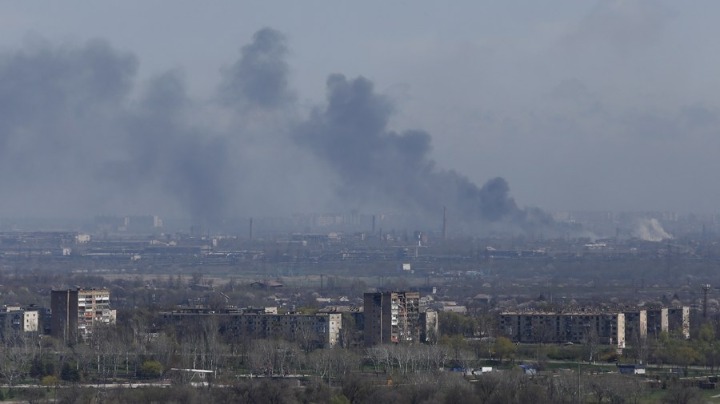
Russia's President Vladimir Putin says his country will continue its yearlong "special military operation" in Ukraine, and he accused the US-led NATO alliance of fanning the flames.
Russia-Ukraine conflict would have cost world economy $1.6 trillion in 2022, according to a study published by the German Economic Institute.
A demonstration in Rome has called for an end to conflict in Ukraine and for the Italian government to stop providing weapons to the country.
Police estimated that some 30,000 people were involved in the march on Saturday when protesters chanted peace slogans and displayed placards and banners.
The Financial Times reported banners read: 'Down with the guns, raise the wages', 'No weapons, no sanctions. Where is the diplomacy?', and 'Enough weapons for Ukraine'.
"The weapons were sent at the beginning on the grounds that this would prevent an escalation," demonstrator Roberto Zanotto told the news service Agence France-Presse, or AFP.
"Nine months later and it seems to me that there's been an escalation. Look at the facts: sending weapons does not help stop a war, weapons help fuel a war."
Speaking to the FT, another protester, Cynthia Masini, said: "Ukrainians are dying and Russians are dying and it makes no sense. We are sending weapons while our sons and daughters are warm and comfortable in their beds, and children are dying there. It is unacceptable."
The activists demanded an end to the fighting and for diplomatic efforts to negotiate a conflict resolution, reported the FT. Giovanni Timoteo, a member of the Italian Workers' Union, said: "I am against sending new weapons to Ukraine. Today, people want peace with weapons. It is unthinkable. Ukraine has the right to defend itself, but we need a big UN initiative for peace."
Former prime minister Giuseppe Conte backed the march and said Italy should be seeking such diplomatic negotiations, noted the AFP. "Ukraine is now fully armed — we need a breakthrough toward a ceasefire and peace negotiations," Conte told reporters.
Student activist Sara Gianpietro told the AFP the conflict "has economic consequences for our country". Inflation in Italy reached 12 percent in October, which is its highest level in nearly 30 years.
The European Union has imposed a series of sanctions against Russia since conflict in Ukraine broke out in February, and Italy has supported Ukraine with weapon supplies from the start.
Italy's new prime minister, Giorgia Meloni, said this position will not change and the government has indicated more weapons would be sent soon, reported the Reuters news agency.
Foreign ministers from the Group of Seven nations, or G7, including Italy, on Friday vowed to continue supporting Ukraine after gathering in Germany to decide on how best to coordinate humanitarian, financial, and military aid ahead of the upcoming winter.
Ukraine was on the agenda as Meloni met with top EU officials in Brussels on Thursday.
Meloni has toned down her anti-European rhetoric in recent weeks, and said she wanted "to give the signal of an Italy that obviously wants to participate, collaborate, and defend its national interest, doing so within the European dimension, seeking the best solutions together with other countries".
European Commission President Ursula von der Leyen said Meloni sent a "strong signal" by selecting Brussels for her first international visit.

WASHINGTON — The United States is privately encouraging Ukraine to signal an openness to negotiate with Russia, Reuters quoted The Washington Post as saying on Saturday.
The paper quoted unnamed people familiar with the discussions as saying that the request by US officials was not aimed at pushing Ukraine to the negotiating table but was an attempt to ensure Kyiv maintains the support of other countries facing constituencies wary of fueling a conflict for many years to come.
It said the discussions illustrated the complexity of US President Joe Biden's administration's position on Ukraine, as US officials publicly vow to support the country with massive sums of aid "for as long as it takes" while hoping for a resolution to the conflict that has taken a big toll on the world economy.
The paper said US officials shared the assessment of their Ukrainian counterparts and acknowledged that Ukraine's President Volodymyr Zelensky's refusal to hold talks with Russia's President Vladimir Putin had generated concern in parts of Europe, Africa and Latin America, where the conflict's effects on costs of food and fuel are felt most sharply.
"Ukraine fatigue is a real thing for some of our partners," the Post quoted one unnamed US official as saying.
Zelensky signed a decree on Oct 4 formally declaring the prospect of any Ukrainian talks with Putin "impossible" but leaving the door open to talks with Russia.
The White House National Security Council had no immediate comment on the accuracy of the report.
US National Security Adviser Jake Sullivan said during a visit to Kyiv on Friday that Washington's support for Ukraine would remain "unwavering and unflinching" after Tuesday's midterm congressional elections.
The US announced $400 million worth of additional security assistance for Ukraine, including refurbishing T-72 tanks from the Czech Republic and missiles for HAWK air defenses that could be used against Russian drones and cruise missiles.
The new assistance brought the amount of US military aid sent to Kyiv to more than $18.2 billion since the conflict began.
Meanwhile, external power has been restored to the Zaporizhzhia nuclear power plant two days after it was disconnected from the power grid, the UN nuclear watchdog IAEA said on Saturday.
Agencies via Xinhua

UNITED NATIONS - UN Secretary-General Antonio Guterres warmly welcomes the announcement from Russia on its resumed participation in the implementation of a deal to facilitate grain export via the Black Sea, his spokesman said on Wednesday.
Guterres is grateful for the diplomatic efforts of Turkiye, and thanks UN coordinator Amir Abdulla and his team for their work to "keep this vital food supply line open," Stephane Dujarric, the spokesman, said in a statement.
The secretary-general continues his engagement with all actors toward the renewal and full implementation of the Black Sea Grain Initiative, and also remains committed to removing the remaining obstacles to the exports of Russian food and fertilizer, the statement said.
On July 22, Russia and Ukraine separately signed a document in Istanbul with Türkiye and the United Nations on grain and fertilizer exports from Ukraine and Russia to ensure supplies to global markets amid the Russia-Ukraine conflict.
On Oct. 29, Russia announced the decision to immediately and indefinitely suspend its implementation of the Black Sea Grain Initiative, accusing Ukraine of launching drone attacks against the Russian Black Sea Fleet's ships and infrastructure at the naval base in Sevastopol.
Russia on Wednesday announced its return to the implementation of the deal, saying Ukraine has promised not to use the humanitarian corridor for military attacks.
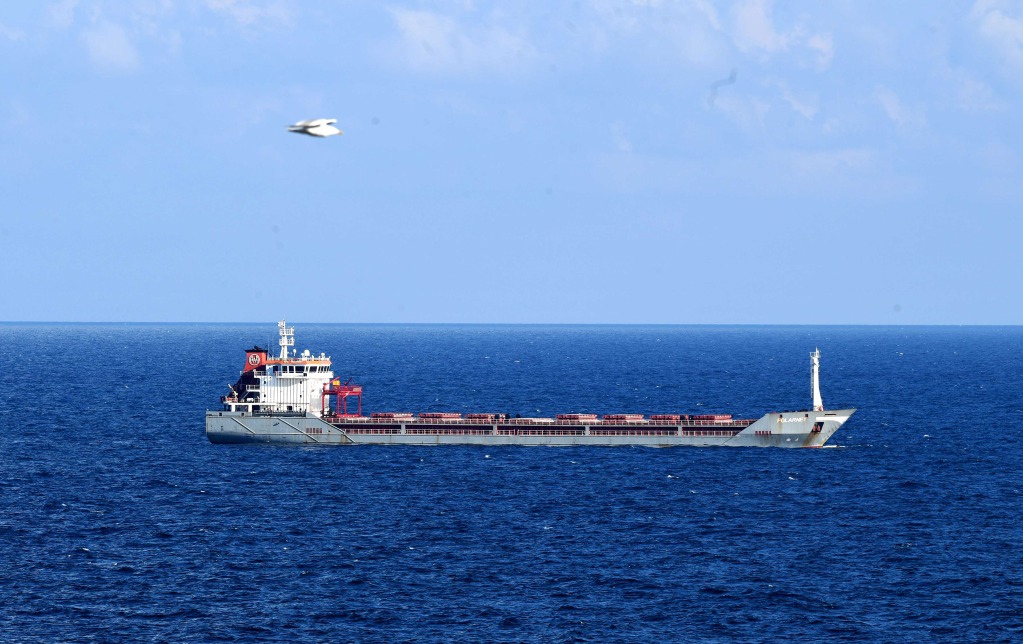
Russia said on Wednesday it would resume its participation in a deal to free up vital grain exports from Ukraine after suspending it over the weekend.
The Russian defense ministry said it had received written guarantees from Kyiv not to use the Black Sea grain corridor for military operations against Russia.
"The Russian Federation considers that the guarantees received at the moment appear sufficient, and resumes the implementation of the agreement," the ministry statement said.
The ministry said Kyiv guaranteed "the non-use of the humanitarian corridor and Ukrainian ports defined in the interests of the export of agricultural products for conducting military operations against the Russian Federation".
The announcement came after Russian President Vladimir Putin told Turkish leader Recep Tayyip Erdogan a day earlier that he wanted "real guarantees" from Ukraine that it will not use the Black Sea corridor for military activities before rejoining the grain agreement.
The deal, brokered by Turkiye and the United Nations, allowed Ukrainian grain products to resume exports, easing a global food crisis caused by the conflict.
On Saturday, Russia accused Ukraine of misusing the safe-shipping corridor for an attack on Russian ships in Crimea and suspended its participation in the deal.
The corridor was touted as a way to secure food supplies to the neediest nations. Moscow is ready to supply African nations with "large volumes" of grain and fertilizers out of its own stocks for free, Putin said.
Erdogan earlier said that Russian Defense Minister Sergey Shoigu had told his Turkish counterpart that the July 22 grain deal would continue to operate as of midday on Wednesday.
The prices of wheat, soybeans, corn and rapeseed fell sharply on global markets following the announcement, which eased concerns about the growing unaffordability of food.
In a Tuesday night video address, Ukrainian President Volodymyr Zelensky said ships were moving out of Ukrainian ports with cargoes thanks to the work of Turkiye and the United Nations.
The grain deal, which was due to be renewed on Nov 19, was intended to combat the global food shortages stoked by the conflict between Russia and Ukraine. The agreement has allowed more than 9.7 million tons of grain and other foodstuffs to leave Ukrainian ports.
The grain deal aims to help avert famine in poorer countries by injecting more wheat, sunflower oil and fertilizer into world markets and to ease a steep rise in prices. It targeted the prewar level of 5 million metric tons exported from Ukraine each month.
Agencies contributed to this story.
MOSCOW -- The Russian Defense Ministry announced Monday that as the main participant in the Black Sea Grain Initiative, Russia does not withdraw from it but suspends it.
Russia has halted traffic along the security corridor in the Black Sea defined by the grain export deal with Ukraine, the ministry said in a statement, accusing Kiev of launching military attacks via the humanitarian route.
"The movement of ships along the security corridor is unacceptable since the Ukrainian leadership and the command of the Ukrainian Armed Forces use it to conduct military operations against Russia," the statement said.
"There is no question of guaranteeing the security of any object in the corridor until the Ukrainian side accepts additional obligations not to use this route for military purposes," it said.
The ministry said the Russian side has conveyed its position to UN Secretary-General Antonio Guterres and the UN Security Council, and hopes that the UN will assist in obtaining guarantees from Ukraine "not to use the humanitarian corridor and Ukrainian ports designated for the export of agricultural products for conducting military operations against Russia."
On July 22, Russia and Ukraine separately signed a document in Istanbul with Türkiye and the United Nations on grain and fertilizer exports from Ukraine and Russia to ensure supplies to global markets amid the Russia-Ukraine armed conflict.
On Oct. 29, Russia announced the decision to immediately and indefinitely suspend its implementation of the Black Sea Grain Initiative, accusing Ukraine of launching drone attacks against the Russian Black Sea Fleet's ships and infrastructure at the naval base in Sevastopol.

Blasts were heard in Kyiv on Monday and Ukrainian authorities reported Russian missile strikes around the country, after Moscow blamed Kyiv for an attack on its Black Sea fleet and pulled out of a deal to allow Ukrainian grain shipments.
Ukrainian Foreign Ministry spokesman Oleg Nikolenko said missiles had hit energy infrastructure in Kyiv and other cities, causing electricity and water outages.
The mayor of Kharkiv said missiles had targeted "a critical infrastructure facility" in the northeastern city.
There was no immediate response from Moscow, which has accused Kyiv of attacking its Black Sea Fleet in a Crimean port with 16 drones on Saturday.
Earlier last month, Russia launched airstrikes on Kyiv and other Ukrainian cities, in what it said was a response to an attack on its bridge to Crimea.
Ukraine has neither confirmed nor denied it was behind the attack on the Russian fleet, its typical policy for incidents in Crimea.
Gennady Gatilov, Russia's permanent representative to the United Nations headquarters in Geneva, told Russian daily Izvestia on Monday that there is no platform for holding negotiations on the Ukrainian crisis settlement and no active proposals from Kyiv in this regard.
"There are no active proposals, which can serve as a basis for future political contacts," he said. "Unfortunately, we must acknowledge that there is currently no platform for holding diplomatic negotiations on the settlement of this crisis."
On Sunday, Moscow pulled out of a UN-brokered grain deal after its Black Sea Fleet in Crimea was targeted by a drone attack.
"The marine drones were moving in the safe zone of the 'grain corridor'," Russia's Defense Ministry said in a statement on Sunday, adding that it had "lifted" some of the drones' debris from the sea.
Ukrainian President Volodymyr Zelensky accused Russia of "blackmailing the world with hunger" by pulling out of the food export deal negotiated by the UN and Turkiye.
Russia has also accused Kyiv of planning the Sevastopol attack with the help of British military specialists.
Kyiv and the West condemned Moscow's decision to exit the grain deal, which had been agreed to ease a global food crisis.
Russia's blockade of grain exports makes it "impossible" for fully loaded ships to leave port, Ukrainian Infrastructure Minister Oleksandr Kubrakov tweeted.
The agreement, which established a safety corridor through which vessels could travel to Istanbul for inspections, had already allowed more than 9 million metric tons of Ukrainian grain to be exported and was due to be renewed on Nov 19.
Two cargo ships loaded with grain and other agricultural products on Monday left Ukrainian ports, according to a marine traffic website.
The ships, Admiral de Ribas and Mount Baker, were among the 12 ships that were due to leave Ukrainian ports on Monday, according to the Joint Coordination Center that has been overseeing the agreement.
Agencies contributed to this story.
BEIJING -- China welcomes Russia's willingness to hold dialogues and resume negotiations with Ukraine and the United States, Chinese Foreign Ministry spokesperson Wang Wenbin said on Friday.
Wang told a daily news briefing that Chinese State Councilor and Foreign Minister Wang Yi, also a member of the Political Bureau of the Communist Party of China Central Committee, held a phone conversation with Russian Foreign Minister Sergei Lavrov on Thursday, and the two sides exchanged views on the Ukraine crisis.
According to the spokesperson, the Russian side expressed its willingness to hold dialogues and resume negotiations with Ukraine and the United States.
"China welcomes this and hopes that relevant parties will step up diplomatic efforts to ease and even resolve the situation as soon as possible through negotiations and other political channels," the spokesperson said.
The two sides also discussed the issue of not allowing the use of weapons of mass destruction, said the spokesperson, adding that China believes that further escalation of the situation should be avoided to prevent humanitarian disasters.
UNITED NATIONS -- Inspectors from the International Atomic Energy Agency (IAEA) are on their way to visit two facilities in Ukraine after Russia's "dirty bombs" allegations, chief of the UN nuclear watchdog said here Thursday.
"Allegations have been made, inspections are on the way," IAEA Director-General Rafael Grossi told reporters at the UN headquarters after attending a closed-door Security Council meeting.
Inspectors are expected to go to the two locations "in a couple of days" and could reach a conclusion in days, Grossi said.
A separate press release from the IAEA said its inspectors this week would carry out verification activities at two locations in Ukraine, following a written request from the Ukraine government to send teams of inspectors there.
Ukraine's request was issued after Russia made allegations about activities related to the possible production of "dirty bombs" at the two locations, which are under IAEA safeguards and have been visited regularly by IAEA inspectors, the agency said.
The purpose of this week's safeguards visits is to detect any possible undeclared nuclear activities and materials related to the development of "dirty bombs," the IAEA said, adding that it inspected one of the two locations a month ago and no undeclared nuclear activities or materials were found there.
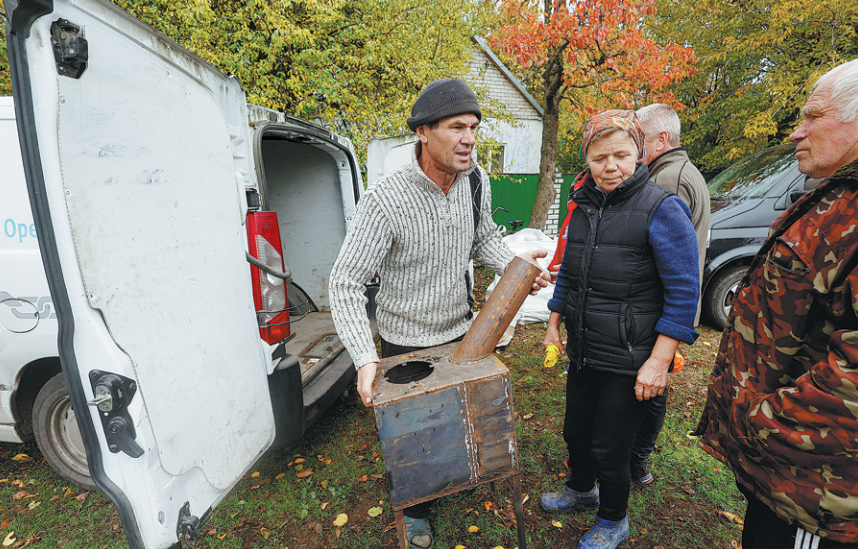
UNITED NATIONS — Russia on Tuesday took its case to the United Nations Security Council that Ukraine is preparing to use a "dirty bomb", voicing its concerns during a closed-door meeting of the 15-member body.
Moscow sent a letter detailing the allegations to the UN on Monday, and Russia raised the issue at a closed meeting with the Security Council.
"We're quite satisfied because we had raised awareness," Russia's Deputy UN Ambassador Dmitry Polyanskiy told reporters. "I don't mind people saying that Russia is crying wolf if this doesn't happen because this is a terrible, terrible disaster that threatens potentially the whole of the Earth."
He said the evidence was in intelligence information that had been shared with Western counterparts with the "necessary level of clearance".
Kremlin spokesman Dmitry Peskov repeated Russia's allegations on Tuesday and said the West was foolish to dismiss them.
Ukraine dismissed Moscow's claim as an attempt to distract attention from the Kremlin's alleged plans to detonate a dirty bomb.
In a U-turn, a group of progressive Democrats in Congress said on Tuesday it had retracted a letter to the White House urging US President Joe Biden to engage in direct diplomatic talks with Russia, after it triggered an uproar among Democrats and raised questions about the strength of the party's support for Ukraine.
Representative Pramila Jayapal, chair of the Progressive Caucus, said in a statement that the caucus was withdrawing the letter it sent less than 24 hours prior. It was signed by 30 members of the party's liberal flank.
"The letter was drafted several months ago, but unfortunately was released by staff without vetting," the Washington Democrat wrote in a statement. Jayapal said she took responsibility for this as chair of the caucus.
The letter had called for Biden to pair the unprecedented economic and military support for Ukraine with a "proactive diplomatic push, redoubling efforts to seek a realistic framework for a cease-fire".
Several members of the Progressive Caucus issued statements expressing support for Ukraine, noting that they had joined other Democrats in voting for billions of dollars in aid for Ukraine.
Some said they had signed the letter months earlier and that things had changed. "Timing in diplomacy is everything. I signed this letter on June 30, but a lot has changed since then. I wouldn't sign it today," Representative Sara Jacobs said on Twitter.
On Tuesday, the Russian Foreign Ministry barred more persons from European Union member states from entering Russia in response to their anti-Russian actions.
Among the newly blacklisted are representatives of European manufacturers of weapons and military equipment supplied to Ukraine and some lawmakers of the Parliamentary Assembly of the Council of Europe, the ministry said in a statement.
It did not specify who is subject to the travel ban.
Agencies - Xinhua

WASHINGTON — Left-wing US lawmakers on Monday urged President Joe Biden to seek a negotiated settlement with Russia to end the Ukraine conflict, including the exploring of security arrangements acceptable to both sides.
In a letter, 30 House members from Biden's Democratic Party said they agreed with the White House that a settlement was up to Kyiv.
But as legislators responsible for the expenditure of tens of billions of US taxpayer dollars in military assistance in the conflict, such involvement in this conflict also creates a responsibility for the United States "to seriously explore all possible avenues", said the lawmakers led by Representative Pramila Jayapal, leader of the House Progressive Caucus.
They called for direct engagement with Russia.
"Such a framework would presumably include incentives to end hostilities, including some form of sanctions relief, and bring together the international community to establish security guarantees for a free and independent Ukraine that are acceptable for all parties, particularly Ukrainians," they wrote.
When asked about the letter, State Department spokesman Ned Price said nobody wants to see this conflict end more than their Ukrainian counterparts.
"We don't know when it will transpire, principally and solely because we have not seen any indication from the Russians that they are prepared to engage in that diplomacy and dialogue," he told reporters.
White House press secretary Karine Jean-Pierre said separately: "We've been very clear: nothing about Ukraine without Ukraine."
Top Russian officials phoned Western counterparts on Sunday and Monday to tell them Moscow suspected Ukraine of planning to use a so-called dirty bomb laced with nuclear material, Reuters reported.
Ukrainian President Volodymyr Zelensky said Russia planned such an attack itself to blame Ukraine.
Russia sent a letter on its claims about Kyiv to the United Nations on Monday and was expected to raise the issue with the Security Council at a meeting on Tuesday.
"We will regard the use of the dirty bomb by the Kyiv regime as an act of nuclear terrorism," Russia's UN Ambassador Vassily Nebenzia told UN Secretary-General Antonio Guterres and the Security Council in the letter, seen by Reuters.
Also, the UN nuclear watchdog is preparing to send inspectors in the coming days to two Ukrainian sites at Kyiv's request over the dirty bomb issue, it said on Monday.
German President Frank-Walter Steinmeier vowed further support to Ukraine during a surprise visit to Kyiv on Tuesday.
Steinmeier had originally planned to visit Ukraine in April, but Kyiv refused to welcome him then. Kyiv and Berlin later patched up their disagreement.
Agencies via Xinhua
MOSCOW -- The Russian Foreign Ministry on Tuesday barred more persons of the European Union member states from entering Russia in response to their anti-Russian actions.
Among the newly blacklisted are representatives of European manufacturers of weapons and military equipment supplied to Ukraine and some lawmakers of the Parliamentary Assembly of the Council of Europe, the ministry said in a statement.
The Russian side did not specify who are subject to the travel ban.
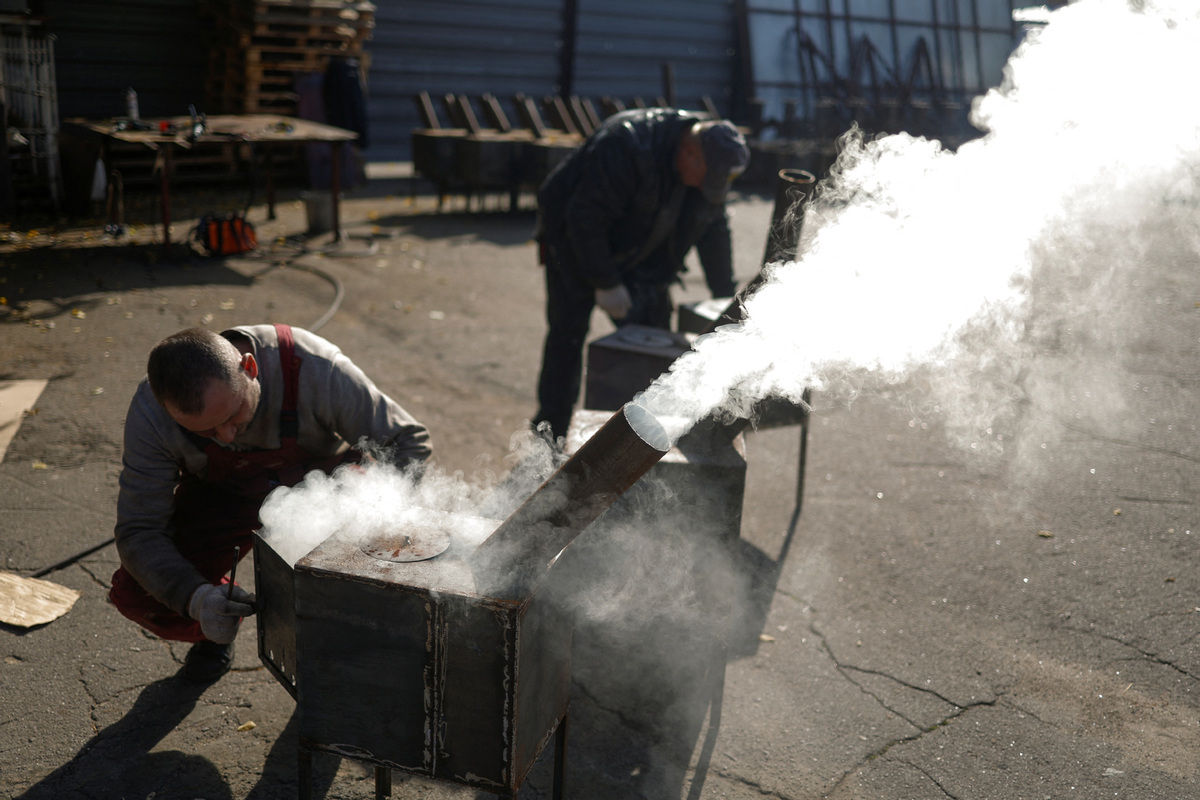
KYIV -- Ukraine needs 4 billion euros (about 3.97 billion US dollars) to go through the winter cold season, the Interfax-Ukraine news agency reported on Tuesday, citing Minister for the Development of Communities and Territories of Ukraine Oleksiy Chernyshov.
"We need four billion euros to get through this winter -- to renovate houses, to support health care and energy supplies," Chernyshov said at the International Expert Conference on the Recovery, Reconstruction and Modernisation of Ukraine in Berlin, Germany.
Besides, Ukraine lacks backup equipment for water and power supply, such as mobile water purification stations, mobile heating stations, diesel generators and electric heaters, the minister said.
Ukraine is facing an energy crisis ahead of the winter cold season due to the conflict with Russia that started on Feb. 24.
On Oct. 18, Ukrainian President Volodymyr Zelensky said that Russia's attacks had destroyed about 30 percent of Ukraine's power stations, causing massive blackouts across the country.
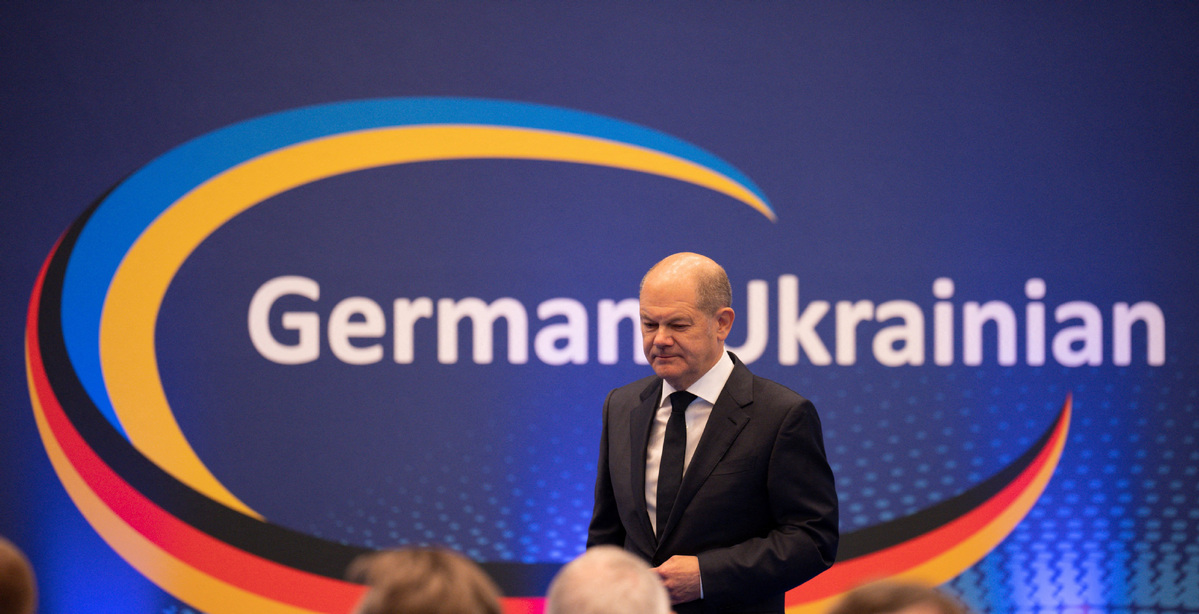
BERLIN -- German Chancellor Olaf Scholz on Monday vowed to provide wide-ranging assistance in rebuilding Ukraine, including aid for agriculture, the health sector and the restoration of the country's energy networks.
"Together with our partners, we will support Ukraine as long as necessary," Scholz said at the opening of a German-Ukrainian Business Forum in Berlin. The restoration of the country will be "a generational task," he said.
Rebuilding Ukraine will cost $349 billion, according to an analysis released last month by the World Bank, the European Union (EU) and the Ukrainian government.
This figure is equivalent to one and a half times Ukraine's gross domestic product (GDP) before the start of the conflict with Russia.
"Ukraine's needs for recovery and reconstruction are massive -- and growing," said World Bank President David Malpass earlier this month.
Meanwhile, Ukrainian Prime Minister Denys Shmyhal has estimated that the cost of reconstruction in the country will be as much as $750 billion.
Scholz promised that German companies will invest in Ukraine, emphasizing that "whoever invests in the reconstruction of Ukraine today invests in a future EU member state."
Ukraine has been a recognized candidate for membership of the EU since June, and Scholz reiterated Germany's support for its accession. "I am very serious about this commitment, with all that it entails," he said.

Russia leader's move gives authorities sweeping powers to impose curfews
Russian President Vladimir Putin signed a decree on Wednesday declaring martial law in Donetsk, Lugansk, Zaporizhzhia and Kherson.
The four regions' leaders will also be granted "additional authority", Putin said.
The upper house Federation Council approved the declaration later on Wednesday, the final formality needed for it to become official. It took effect on Thursday.
Kremlin spokesman Dmitry Peskov said Russia will not close its borders following the martial law declaration.
Under Russian law, martial law gives authorities sweeping powers to impose curfews, travel and residence restrictions, military censorship and more.
The country's Constitution states that when martial law is in effect, "the rights and freedoms of citizens of the Russian Federation, foreign citizens and stateless persons" may be restricted.
Putin also announced the "formation of a coordinating council "under the Russian government, which would work toward meeting all necessary objectives that arise in the course of the country's special military operation, the Kremlin said, adding that the council would be headed by Prime Minister Mikhail Mishustin.
During a televised meeting of Russia's Security Council, Putin accused Ukraine of using "terrorist methods". "They send sabotage groups into our territory," he said, claiming Moscow had foiled other attacks, "including at our nuclear power facilities", after the Crimea bridge was targeted.
The Russian president announced that the security powers of all Russian regional governors would be boosted, and he ordered the creation of a special coordinating council under Mishustin to step up the battle effort.
He said the "entire system of state administration", not only the specialized security agencies, must be geared to support Russia's special military operation.
Moscow Mayor Sergey Sobyanin sought to quell worries that the declaration would impact residents of the Russian capital, saying in a Telegram post that the city will not impose any measures that might change "the normal rhythm of life" in the city.
Russia's Krasnodar, Belgorod, Bryansk, Voronezh, Kursk and Rostov regions should increase their security and limit the movement of vehicles over their borders, according to the Kremlin's decrees.
Accusation denied
In a letter from Ukraine's United Nations Ambassador Sergiy Kyslytsya to UN Secretary-General Antonio Guterres and members of the UN Security Council, Ukraine accused Iran of violating a UN Security Council ban on the transfer of drones capable of flying 300 kilometers. Russia and Iran denied on Wednesday that the drones are Iranian.
Russia's Deputy UN Ambassador Dmitry Polyanskiy told reporters after a council meeting late on Wednesday that the unmanned aerial vehicles, or UAVs, used by the Russian army in Ukraine "are manufactured in Russia, so these are all baseless allegations".
He accused Western nations of their "usual shameful practice" of trying to pressure Iran by leveling such accusations about its violation of Resolution 2231.
Iran's UN Ambassador Amir Saeid Iravani "categorically rejected unfounded and unsubstantiated claims" that Iran has transferred UAVs for use in the conflict.
"Moreover, Iran is of the firm belief that none of its arms exports, including UAVs, to any country" violate Resolution 2231, he said.
Iranian President Ebrahim Raisi on Wednesday rejected certain "unsubstantiated claims" about Teheran's stance toward the conflict in Ukraine, saying Iran is ready to play a role in ending the crisis.
Making the remarks in a phone call with his Polish counterpart Andrzej Duda, Raisi said Teheran is ready to use "all its capacities and potential" to help end the conflict in Ukraine.
Meanwhile, leaders of the 27 European Union countries were meeting on Thursday for the second time to try to bring down energy prices, though persistent divisions between them mean the bloc is unlikely for now to put a ceiling on what it pays for gas.
The EU countries are expected to back an alternative price benchmark for liquefied natural gas and joint gas buying, after earlier agreeing to cut consumption and introduce levies on windfall profits in the energy industry.
Agencies contributed to this story.
MOSCOW - The situation in the zone of the special military operation can be described as tense, commander of Russia's joint group of forces in Ukraine Sergey Surovikin told media on Tuesday.
The Ukrainian side does not abandon attempts to attack the positions of Russian troops, he said, adding that the Ukrainian army losses 600 to 1,000 people every day.
The Russian army will act consciously in a timely manner, without excluding the adoption of difficult decisions, he said.
KYIV — Moscow and Kyiv on Monday carried out one of the biggest prisoner swaps of the conflict so far, exchanging a total of 218 detainees, officials from both sides said.
The Russian defense ministry said 72 people that returned from Ukraine were crew members of civilian ships held by Ukraine since February.
It said all those returned would be flown to Moscow and will be provided with medical and psychological assistance.
Andriy Yermak, head of the Ukrainian president's staff, said some of the Ukrainians had been captured after Russian forces took the giant Azovstal steelworks in the port city of Mariupol in May.
In his daily address late on Monday, Ukrainian President Volodymyr Zelensky said 96 of the swapped prisoners are servicewomen, including 37 evacuees from Azovstal, and 12 are civilians.
Separately, Ukraine's interior ministry said some of the Ukrainians had been in jail since 2019 after being detained by authorities in eastern regions.
Denis Pushilin, head of the Donetsk region in eastern Ukraine, confirmed the exchange, saying that out of 110 people agreed in the swap, two people had decided to remain in Russia.
Meanwhile, the fight between the two countries continued on Tuesday. Kyrylo Tymoshenko, deputy head of the Ukrainian presidential office, said there had been three Russian strikes on an unspecified energy facility.
Ukraine's military said it shot down eight Iranian-made drones and two Russian cruise missiles on Monday. Iran on Monday stuck to its denial that it is supplying drones.
The Kremlin on Tuesday said the four regions of Ukraine that Russia declared it had incorporated in recent weeks fall under the protection of Russia's nuclear arsenal.
In a call with reporters, Kremlin spokesman Dmitry Peskov said: "These territories are inalienable parts of the Russian Federation ...and their security is provided for at the same level as the rest of Russia's territory."
Agencies via Xinhua
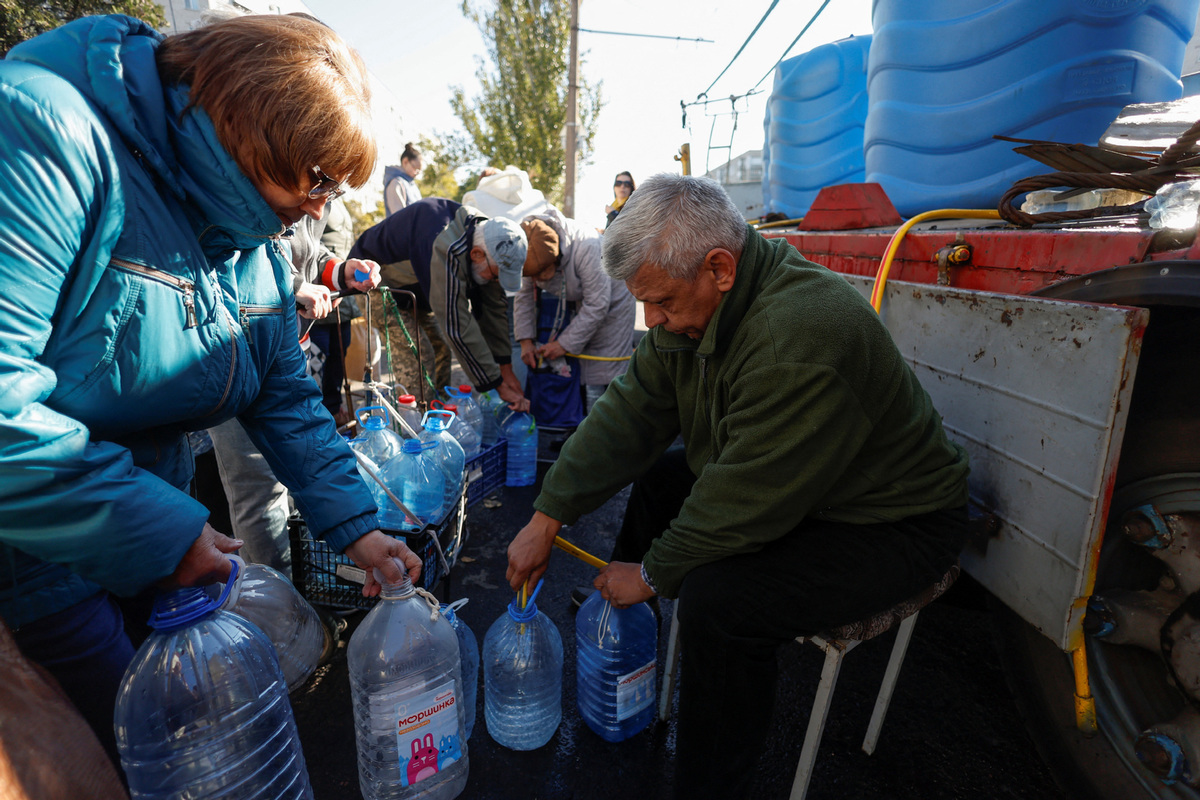
KYIV/MOSCOW — Russian and Ukrainian forces are engaged in heavy fighting in the Donbas region, while Kyiv came under attack from drones early on Monday, officials said.
Fighting was intense this weekend in Donetsk and Lugansk, which make up the industrial Donbas, and Kherson Province in the south.
Russia's defense ministry said on Sunday its forces had repelled efforts by Ukrainian troops to advance in the Donetsk, Kherson and Mykolaiv regions. Russia also said it was continuing airstrikes on military and energy targets in Ukraine.
Ukrainian President Volodymyr Zelensky said in his nightly address on Sunday that the key hot spots in Donbas are Soledar and Bakhmut cities.
"Very heavy fighting is going on there," he said.
Reuters was not able to independently verify reports on the fighting.
Away from the front line, the Ukrainian capital was attacked on Monday by so-called kamikaze drones, wrote Andriy Yermak, head of the president's staff, on Telegram.
Kyiv Mayor Vitali Klitschko also said on Telegram that several blasts had rocked the central Shevchenkivskyi district, with a Reuters witness reporting three explosions.
The same district was hit by explosions a week ago.
In Russia, authorities said on Sunday that a criminal investigation had been opened after gunmen shot dead 11 people and wounded 15 at a military training ground in the Belgorod region.
Russia's RIA news agency, citing the defense ministry, said two gunmen opened fire with small arms during a training exercise on Saturday, targeting personnel who had volunteered to fight in Ukraine. RIA said the gunmen, who it referred to as "terrorists", were shot dead.
Meanwhile, the European Union stepped up its military support for Ukraine on Monday by launching a mission to train 15,000 Ukrainian soldiers and providing 500 million euros ($487.8 million) more for weapons.
Foreign ministers from the bloc's 27 member states signed off on the decisions at a meeting in Luxembourg.
Several EU nations, including Germany and France, are already training Ukrainians to use modern artillery systems, missile launchers and air defenses they are delivering to Kyiv.
In another development, the United Nations children's agency said on Monday that the ongoing Russia-Ukraine conflict and the resulting economic fallout have thrown 4 million children into poverty across Eastern Europe and Central Asia, a 19 percent increase since 2021.
UNICEF drew its conclusions from a study of data from 22 countries.
Children are bearing the "heaviest burden" of the economic crisis caused by the conflict in Ukraine, UNICEF said.
Agencies via Xinhua
China called on its citizens still in Ukraine to strengthen security precautions and evacuate the country given the severe security situation within Ukraine on Saturday.
The appeal was made by the Foreign Ministry and China's embassy in Ukraine in a news release.
China's embassy in Ukraine will assist in organizing the evacuation and transfer of personnel in need. Those in Ukraine should contact the embassy as soon as possible and register their personal information. People who voluntarily evacuate and transfer by themselves are asked to report to the diplomatic mission.
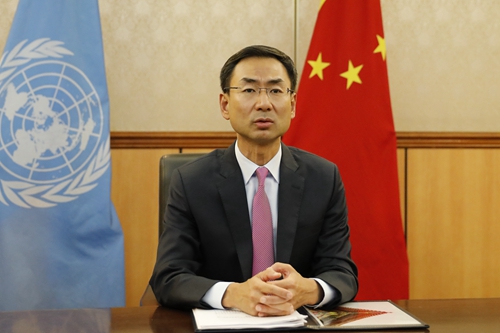
A Chinese ambassador to the United Nations on Wednesday called for a relaunching of peace talks and the creation of conditions for a political settlement to the Ukraine crisis.?
"The General Assembly, as the most representative organization of the UN, should play an active and constructive role on the issue of Ukraine by bridging differences and forming consensus, garnering the greatest synergy for peace talks, and finding the greatest common factor among member states," Geng Shuang, China's deputy permanent representative to the UN, said at the General Assembly's 11th emergency special session on Ukraine.
"We have always believed that any action taken by the GA should be conducive to the de-escalation of the situation, be conducive to the early resumption of dialogue, and be conducive to the promotion of a political solution to this crisis," he continued.
"The draft resolution submitted to this emergency special session for voting will not help achieve the above-mentioned objectives. Therefore, the Chinese delegation will abstain," Geng said.
The UNGA on Wednesday adopted a resolution on the Ukraine crisis.
Geng said the work of the GA should be conducted in full accordance with the rules of procedure and should reflect fairness and impartiality. "With regard to procedural issues, the views of member states should all be fully expressed, and their motions should all be given equal weight," he said.
China is deeply worried about the recent intensification of ground conflicts and saddened by the civilian casualties and damages to civilian facilities, said Geng.
"What is urgent now is to guide the parties concerned to exercise restraint, avoid escalation of conflicts, prevent the confrontation from getting out of control, and to de-escalate the situation. In the final analysis, the Ukraine crisis has to be resolved peacefully." Geng said.
"However daunting the difficulties and challenges are, the door to political settlement shall not be closed, diplomatic negotiations shall not be stalled, and efforts to stop hostilities and promote peace talks shall not be slackened," he continued.
"The international community must encourage the parties concerned to relaunch peace talks as soon as possible, incorporate reasonable concerns into negotiations, put feasible options on the table, and create conditions and space for the cessation of hostilities and settlement of the crisis," he said.
Geng pointed out that since the outbreak of the crisis, the humanitarian situation in Ukraine has been deteriorating, and the coming winter will further aggravate the difficulties.
"China calls on the international community to increase humanitarian assistance to Ukraine and its neighboring countries, to ensure proper resettlement of the people affected by the conflict," the envoy said.
Geng emphasized that the safety and security of nuclear facilities cannot be compromised, not even by the smallest margin.
Geng said that all-out and indiscriminate sanctions will not help solve the problem. Instead, "they will only disrupt the stability of global supply and industrial chains, amplify the spillover effects of the crisis, and affect the normal life of the people around the world".
Geng said that the Cold War mentality should be abandoned to prevent the world from falling into division. "The crisis in Ukraine shows once again that clinging to the Cold War mentality and bloc politics, creating bloc confrontation, and pursuing absolute security will not bring peace, but will only lead to conflicts, which serves no one's interests."
"It is irresponsible and dangerous to focus on ideological differences, intimidate and force other countries to take sides, create isolation and exert pressure, and engage in decoupling and chain-cutting," the envoy said.
Geng reiterated that the sovereignty and territorial integrity of all countries should be respected; the purposes and principles of the UN Charter should be observed; the legitimate security concerns of all countries should be taken seriously; and support should be given to all the efforts aimed at peaceful solutions.

Putin tells IAEA chief 'all issues' can be covered, as G7 discusses Ukraine
MOSCOW/KYIV/WASHINGTON — Russian President Vladimir Putin on Tuesday told UN nuclear agency chief Rafael Grossi he was "open for dialogue" on the Zaporizhzhia nuclear power plant as the G7 nations convened on Tuesday and pledged continued support for Ukraine.
Putin said during the meeting with Grossi that he will gladly discuss all issues, including the situation around the Zaporizhzhia nuclear plant, TASS reported.
"We … will gladly discuss all issues that mutually interest us. …For example, everything involving the situation" around the Zaporizhzhia plant, Putin said. "In any case, we are open for this dialogue."
A statement by the International Atomic Energy Agency, or IAEA, released after the meeting said that Grossi was due to meet with Ukrainian President Volodymyr Zelensky in Kyiv "later this week" for further talks regarding Europe's biggest nuclear power plant.
Grossi met Zelensky last week for discussions on setting up a nuclear safety and protection zone around the Zaporizhzhia plant.
In recent weeks, Grossi had been "engaging in intense consultations with both Ukraine and the Russian Federation to agree and implement "such a zone "as soon as possible", the IAEA statement said.
It came as the Group of Seven nations convened a meeting on Tuesday and discussed the Russia-Ukraine conflict.
Zelensky continued his appeals to the G7 leaders for more air defense capabilities as the G7 vowed to support Kyiv for "as long as it takes".
The G7 — which groups the United States, Germany, France, Japan, Britain, Italy and Canada — pledged continued "financial, humanitarian, military, diplomatic and legal support … for as long as it takes" to Ukraine, it said in a statement.
The Kremlin said on Wednesday it hoped the G7 would hold "the Kyiv regime" accountable for the crimes it has committed.
In an interview on state television, Russian Foreign Minister Sergey Lavrov said that Moscow was open to talks with the West. Russia was willing to engage with the US or with Turkiye on ways to end the conflict, Lavrov said.
Ukraine on Tuesday received the first of four IRIS-T air defense systems that Germany promised to supply, Reuters quoted a German defense ministry source as saying.
US Treasury Secretary Janet Yellen on Tuesday called on US allies to accelerate financial disbursements to Ukraine.
"We are calling on our partners and allies to join us by swiftly disbursing their existing commitments to Ukraine and by stepping up in doing more," Yellen said as she received her Ukrainian counterpart Sergii Marchenko.
Yellen stressed that the US will begin "to provide the Ukrainian government in the coming weeks with the $4.5 billion in budget assistance passed by Congress on Sept 30".
The funds are part of a $12.3 billion aid package to Ukraine, contained in a stopgap spending bill to avert a shutdown of federal services.
On Wednesday, Russia's Federal Security Service, known by the Russian acronym FSB, said that it had detained five Russians and three citizens of Ukraine and Armenia over the explosion that damaged the bridge in Crimea on Saturday.
The FSB said the explosion was organized by Ukrainian military intelligence and its director Kyrylo Budanov. The explosive device was moved from Ukraine to Russia via Bulgaria, Georgia and Armenia, the security agency said.
The FSB also said that it had prevented Ukrainian attacks in both Moscow and the western Russian city of Bryansk.
Ukraine has not confirmed its involvement in the bridge blast, but some Ukrainian officials have celebrated the damage.
"The explosives were hidden in 22 plastic film rolls weighing 22,770 kilograms," the FSB said.
The rolls left on a boat in August from the Ukrainian port of Odessa to Bulgaria. They then transited through the port of Poti in Georgia, before going being sent overland to Armenia and on to Russia by road, according to the FSB.
The explosives entered Russia on Oct 4 in a truck with Georgian license plates and reached the region of Krasnodar on Oct 6, two days before the blasts, the FSB said.
Agencies via Xinhua
